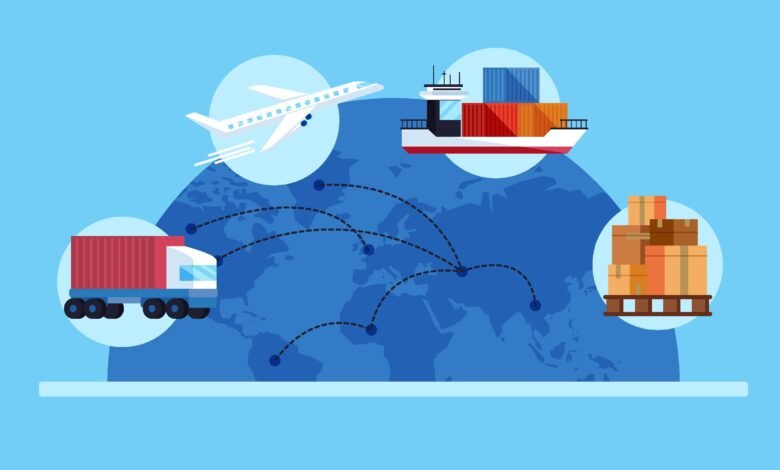The Growing Importance of Freight Forwarding in Global Trade

Global trade has become the growth driver of economies in the hyper-connected modern world. This smooth flow of goods through international boundaries is what makes businesses become competitive, satisfy consumer needs, and make the economy sustainable. In this complex tangle of the import-export business, freight forwarding has proven to be a critical concept, whereby the easy and effective movement of commodities is facilitated. In the case of air, sea transportation, or overland, the freight forwarders are instrumental to fitting the procedure chain and guaranteeing adherence, economy, and just-in-time delivery.
What is Freight Forwarding?
Freight forwarding can be thought of as the shipment and coordination of goods between one location and another through the services of one or more carriers. Some of these carriers can be trains, aeroplanes, trucks, or ships. Freight forwarders act as a link between shippers and transportation services. They drop goods off, pack and ship shipments, and fill out export documents, negotiate shipping costs, customs laws, and insurance costs. In simple terms, they relieve the businesses of the headache of international shipping.
The Role of Freight Forwarders in Global Trade
The increasing complexity in international trade regulations, documentation on customs requirements, and shipping criteria has made freight forwarders a necessity. These professionals will give you an all-around service that is way beyond moving goods. They grant tactical information on the routes of trade, tariffs, and requirements on the materials to be packaged, and assist clients in navigating the trade restrictions and rules that are specific to countries or regions.
Companies such as CFIPAK in Pakistan are serving as the dominant logistic facilitators. As a reputable freight forwarder in Pakistan, CFIPAK helps exporters and importers comply with global standards, ensuring seamless transit of goods across borders. Such services are essential to companies wishing to expand internationally and have the scales of their business managed without having to worry about the logistics of doing it themselves.
Also, the local Karachi economy has benefited from the presence of firms like a well-established logistics company in Karachi, which has ensured efficient handling of cargoes and freight management. Such firms help in streamlining the supply chain by the use of modern tracking systems, the use of digital systems, and a broad network of international partners that would eventually result in cost-cutting and the ability to deliver to the clients in time.
Technological Advancements in Freight Forwarding
There has been a digital transformation of the freight forwarding industry. The introduction of AI-enabled platforms of logistics, the Internet of Things (IoT) equipment for cargo tracking, and digital documentation has transformed freight forwarders, who now work with increased efficiency and transparency. The real-time tracking, automation of bills, predictive analytics, as well as online dashboards, have given businesses the strength to track their shipments and to make informed decisions based on the data.
Another trend that is a game-changer in terms of freight forwarding globally is blockchain technology. It makes documentation tamper-free, provides better security to the data, and decreases the possibility of fraud. The increase in the use of data-driven insights in global trade makes freight-forwarding companies continue to push ahead of others through the incorporation of such innovations in their service portfolios.
Customization and Flexibility in Shipping Solutions
One of the key strengths of modern freight forwarders lies in their ability to customize solutions according to client needs. Whether a business requires cold-chain logistics for pharmaceuticals or bulk shipping for heavy machinery, freight forwarders offer tailored solutions that optimize time and cost.
Moreover, multi-modal transport solutions, where different modes of transport are combined to ensure efficient delivery, are becoming the norm. Freight forwarders are skilled at orchestrating such operations, choosing the best routes and methods to deliver goods safely and efficiently.
Sustainability in Freight Forwarding
As the number of people who take environmental issues seriously increases, freight forwarders are getting pressure to tame their carbon footprint. Green logistics is also becoming common with green transportation, environmentally friendly packaging, and carbon-neutralisation strategies.
Most companies also prioritize shipping partners, which shows a commitment to sustainability. Consequently, freight forwarders that take into consideration the best environmental practices to be embraced in their business operations have a competitive advantage in the current market due to their eco-consciousness.
Freight Forwarding and Economic Development
Freight forwarding also has a direct positive association with economic growth since it brings about trade and opens up business, reduces the cost of transactions, and increases industrial growth. Very effective freight services will connect producers with world markets and make them more competitive in exports and exports to other industries indirectly dependent on imported goods.
Freight forwarders are of significant use to the developing countries since they assist in the development of infrastructure, job creation, and the transfer of technologies. They provide the finest enablers of inclusive economic growth since they bind the remote corners of the globe with the marketplace of the world.
Challenges in the Freight Forwarding Sector
Various challenges characterise the freight forwarding industry, although this industry has been growing. The operations can be disrupted by geopolitical issues, unstable fuel prices, growing trade regulations, and cybersecurity problems. In addition, a lack of skilled professionals and rising customer demands characterized by real-time update requests and a reduction of costs, bring in more pressure.
To be competitive, freight forwarders have to invest in training, technology, and infrastructure. This journey must embrace the shifting dynamics by engaging in collaborative partnerships with carriers, governments, and tech vendors.
Conclusion
In the global business, freight forwarding has transformed beyond being a piecemeal service into a tactical requirement. Freight forwarders lead in innovation, efficiency, and compliance as the needs of cross-border business keep increasing. They fulfil an imperative need in connecting the shippers with the global markets, hence providing the assurance that good is delivered to the destination at the right time and within the stipulated budget and its good condition.
Be it a start-up exporting handicrafts or an international company with sophisticated supply chains, it would be hard to overestimate the importance of a competent and reputable freight forwarder. Freight forwarding is one of the pillars of development in a world experiencing global trade, as a result of which it has prospered.

